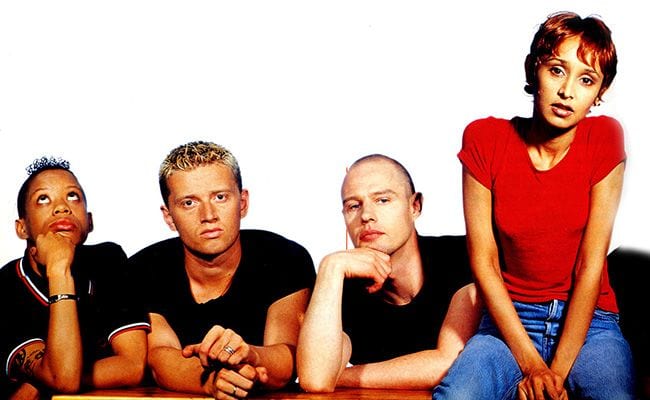
The Spice Girls achieved greatness by putting an end to the misery of Britpop, and for that I am truly grateful. Much of Britpop’s music seemed (and remains) mundane and insular, with grating Mockney/Mancunian accents celebrating a jingoistic dumbing-down of culture. The narrow aesthetic of being yobby and uncouth may have appealed to many because it was an easy option, but generally the output was obvious and uninspired, with awkward music and lack-lustre lyrics. The nation evoked in Britpop was generally white, with little insight expressed on inequality, racism, unemployment and the difficulties caused by de-industrialisation.
Many of the Britpop bands appeared to live or promote “Lad” culture, and female interlopers clearly had to be strong individuals to make any sort of advances in a strange pre-feminist, “Men Behaving Badly” environment. Looking back now, the music produced by Britpop women tended to be the best in the genre, even though Louise Wener (Sleeper) and Justine Frishmann (Elastica) came close to assimilating laddish behaviour with semi-aggressive interview techniques doled out for the media. Echobelly’s lead singer Sonya Madan always seemed more sophisticated, and the band’s music, much admired by R.E.M. and Madonna, was pretty good too. Proof of the pudding comes thanks to Cherry Red’s expanded re-releases of Echobelly’s debut Everyone’s Got One and follow-up On.
Everyone’s Got One was released in 1994, three or four years in to Britpop, but a year in which the movement fully took off due to Blur’s Parklife and Oasis’ Definitely Maybe. Minor Britpop stars Echobelly added some much needed diversity, with Madan wondering on the very first track if she was alone because of her “colour or culture” (“Today Tomorrow Sometime Never”). Racism is also considered in “Call Me Names”, with a clever use of playground sound effects. Madan’s singing is often enigmatic, as if she’s swallowing her words, and it’s easy to see why she was compared to Morrissey (but with less whinging and more positivity).
Indeed, generally Madan’s voice soars over what could be considered relatively standard indie pop; it’s tough and spiky, with a point to prove, not far away from a band like Suede. The ideas in the songs are possibly more interesting than the music, showing a strong questioning spirit. “Father, Ruler, King, Computer” tackles the thorny issue of gender, as Madan explains that she was brought up to believe her goal should be a husband, only to realise that in fact she is “whole all by myself / I don’t need nobody else”. “Give Her a Gun” rails against sexist oppression and being a woman in a man’s world, one in which women have only one percent of the wealth despite being fifty percent of the population.
Madan’s take on life however does not appear to be mere posturing. The tongue-in-cheek “I Can’t Imagine the World Without Me” shows a determined singularity of viewpoint and the raucous first single, “Insomniac”, revels in the glory of youth, who we know have it all.
CD2 contains a generous helping of b-sides and bonus tracks, with the original Bellyache EP and a BBC radio appearance from a Steve Lamacq Evening Session; b-side “Sober” has a great vocal and the live tracks show a band firing on all cylinders.
1995’s On was Echobelly’s most commercially successful album, reaching the dizzy heights of number 4 in the UK album charts. Singles “King of the Kerb” (addressing homelessness and prostitution) and “Great Things” (a poppy anthem to the future) both have catchy hooks, and Madan shines as a front-woman. “Natural Animal” and “Pantyhose and Roses” both contain some fine observations about human nature; “Something Hot in a Cold Country” contains the great put-down of “you’re a pain, not a poet” and “Four Letter Word” includes some great wordplay backed by fuzzy rock guitar.
For On‘s re-issue, 12 additional b-sides and rarities are packed onto the first CD to make room for a ‘95 New York gig and a BBC radio session for the second CD. Cream of the crop for the CD1 extras are the acoustic “Bunty” and a swish French version of “Car Fiction”. There’s also a worthwhile acoustic version of “On Turn On” which sounds like a female Nirvana, despite grunge being the supposed enemy of Britpop.
What is effectively a previously unreleased live album on CD2 shows a young band mostly at full pelt, and is made up of tracks from both Everyone’s Got One and On. It demonstrates that Echobelly put on a great live show and is an admirable testament to their relatively short time in the glare of the spotlight. Additional tracks come from a Peel Session at BBC Radio 1, and the band rise to the occasion with great versions of four songs from On.
Both re-issues have full sleeve notes written by Madan and these releases clearly do not skimp on extra material; short of travelling back in time to the ’90s and re-living those heady, parochial days when trainers and a football shirt were the height of fashion, these expanded versions of two “Britpop classics” are everything the Echobelly fan could wish for.


![Call for Papers: All Things Reconsidered [MUSIC] May-August 2024](https://www.popmatters.com/wp-content/uploads/2024/04/all-things-reconsidered-call-music-may-2024-720x380.jpg)



